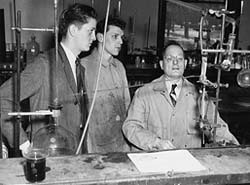
Muskie Archives opens historic Androscoggin River data to researchers
The papers of a Bates College professor who spent decades studying pollution in the Androscoggin River — pollution that prompted the federal Clean Water Act of 1972 — are newly accessible to researchers.
Chemistry professor Walter A. Lawrance served for three decades as the Androscoggin’s state-appointed “rivermaster,” charged with regulating the pollution that paper mills could produce. His studies of river conditions, as well as documentation of research aimed at limiting the mills’ pollution output, are part of the Walter A. Lawrance Papers, a collection now open to researchers at the college’s Edmund S. Muskie Archives and Special Collections Library.
In a coincidence that points up the continuing relevance of the Lawrance collection, the archives announced the opening of the papers even as the state Board of Environmental Protection prepared to revisit a controversial 2005 pollution plan involving an Androscoggin paper company.
By the middle of the last century, paper-mill discharges, along with other industrial impacts and sewage, had reduced the Androscoggin to a lifeless, foam-covered river whose nauseating vapors were thought to tarnish silver and strip housepaint.
The Lawrance collection, says archives director Katherine Stefko, “traces the efforts of one person to clean up a problem that was enormous in scale and affecting thousands of people living along the river.”
The Lawrance papers are a valuable complement to the archives’ extensive holdings relating to Edmund Muskie, a 1936 Bates graduate who served as a Maine governor, U.S. senator and U.S. secretary of state. Muskie grew up in Rumford, an Androscoggin mill town, and his first-hand knowledge of the river’s sorry state inspired him, as senator, to produce the landmark Clean Water Act of 1972.
Lawrance taught at Bates from 1921 until 1965. In 1943, he became a consultant for the state of Maine as the state began legal efforts to curtail pollution from three Androscoggin paper mills. The Bates professor was given the responsibility of developing anti-pollution standards for the river, and thus initiated his annual study of the river’s odor and other qualities.
In 1947, the Maine Supreme Court appointed him “rivermaster” (later called “administrator”) of the Androscoggin, giving Lawrance the power to restrict not only the amount of waste the mills discharged, but also their overall production. In this role, Lawrance worked collaboratively with each company to determine ways of controlling the problem.
Lawrance’s students were essential to his Androscoggin studies. In a 1998 Lewiston Sun Journal article, 1961 graduate Gary Reed recalled a summer spent with Lawrance on an old PT boat, testing the water and pouring sodium nitrate into it to try to raise the oxygen content. “At the hot part of the summer we dumped every day and sampled every day,” Reed told the paper.
A turning point came in 1967 when International Paper adopted the Kraft method of producing paper, which reduced the discharge of liquid pollutants. The other companies converted by 1977, and from this point onward voluntary action and federally mandated cleanup efforts resulted in some relief for the river.
The Maine Supreme Court discontinued the position of rivermaster in 1978, and Lawrance officially retired from his duties. He died in 1987.
Under Lawrance’s leadership, Stefko says, cleanup efforts “made extraordinary progress from 1940 to 1970. When he started, people used to say the river was too thick to paddle and too thin to plow. And by the time he completed his work, he was anticipating — over-optimistically, as we now know — that people would be swimming and fishing in the river within two or three years.”
Today’s Androscoggin is much cleaner than it was in the 1950s and ’60s, but nevertheless is the only major river in Maine failing to meet the standards for a Class C waterway under the Clean Water Act that Muskie initiated. Dams, nonpoint-source pollution and pollution from the paper industry all remain significant sources of concern. Pollution has so depleted the natural oxygen levels in Gulf Island Pond, a sluggish 14-mile stretch above Lewiston, that in order to support aquatic life the gas is introduced by a giant bubbling system.
As Androscoggin Valley communities in recent years have come to appreciate the cleaner river, legal and legislative efforts to sustain the pace of improvement have continued. Following contentious public hearings this past spring, the state Board of Environmental Protection was scheduled to take up a controversial pollution plan involving the Verso Mill, formerly International Paper, in August.





